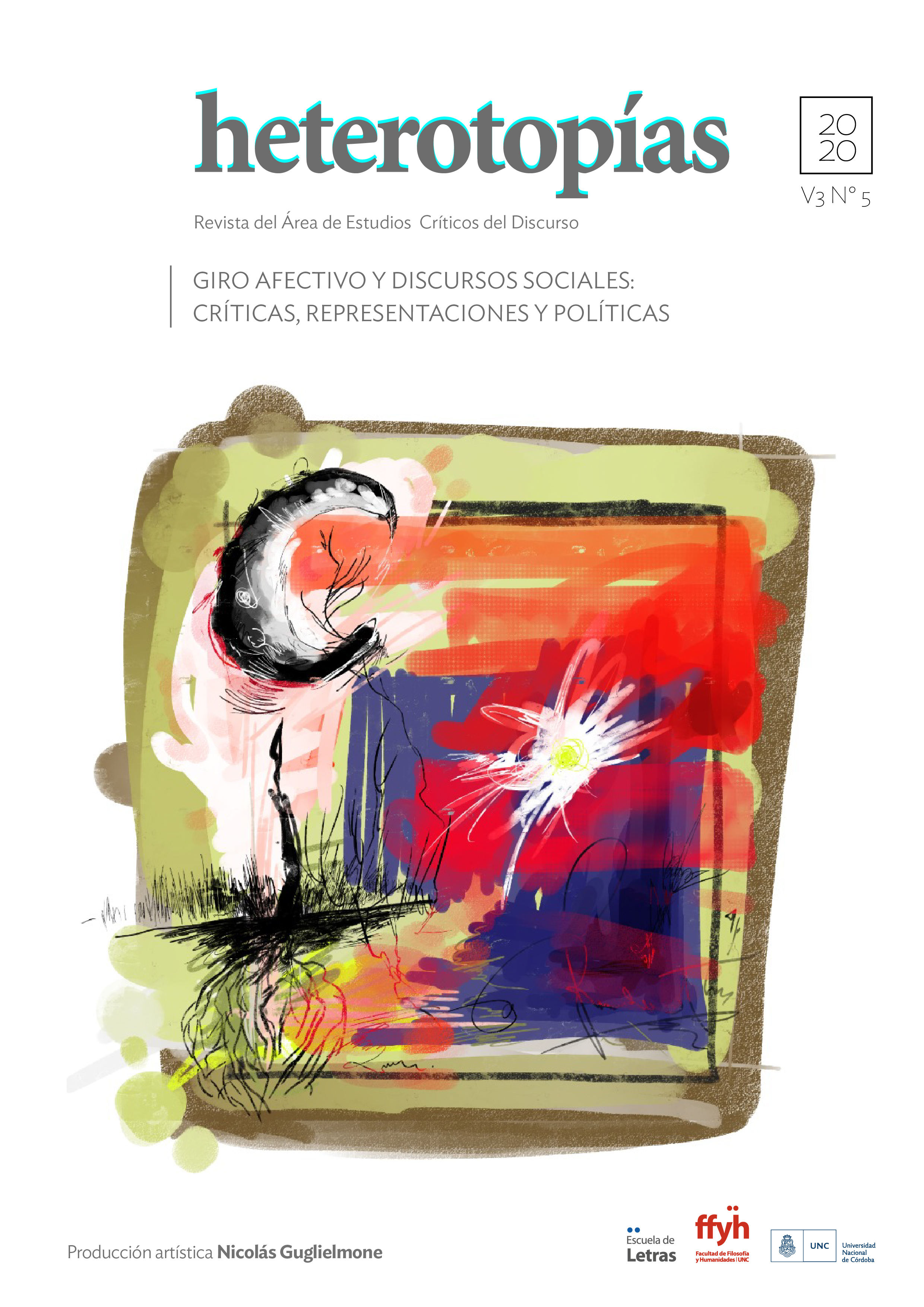Affidamento masculino: El arte queer del fracaso del varón patriarcal
Main Article Content
Abstract
In the British film The King's Speech (2010), the friendship between King George VI and the speech therapist Lionel Logue, who treated his extreme stuttering, is depicted as an ensemble of unusual practices and affections between men, which open lines of flight from patriarchal and bourgeois hegemonic masculinity. I call this set of practices and affects, for which there is no specific name yet, male affidamento and consider it to function as a device of desubjectivation and depatriarchalization, since it enables the process by which men abandon passive obedience to pre-established patriarchal norms and risk losing their ontologically secure position as valid social subjects, even if it leads them to the uncomfortable boundary between the acceptable and the abject. Therefore, I propose that male affidamento is a form of the queer art of failure of the patriarchal male, since it resignifies the inadequacy to the normalizing prescriptions of subjectivity as an opportunity to find freer forms of being a man. I also propose that this type of popular fiction offers the public the opportunity to critically rethink their everyday experience, thus distancing myself from the position of cultural criticism according to which it is impossible to find queer proposals in products manufactured for mass consumption by multinational companies.
Downloads
Article Details

This work is licensed under a Creative Commons Attribution-NonCommercial-ShareAlike 4.0 International License.
Those authors who have publications with this journal, accept the following terms: Those authors who have publications with this journal, accept the following terms:
a. The authors will keep their copyright and guarantee to the journal the right of first publication of their work, which will be simultaneously subject to the Creative Commons Attribution - Non-Commercial - Share Alike (by-nc-sa) Attribution License; no commercial use of the original work or any derivative works is allowed, the distribution of which must be done with a license equal to the one that regulates the original work.
b. Authors may adopt other non-exclusive license agreements for the distribution of the published version of the work (e.g., deposit it in an institutional telematic archive or publish it in a monographic volume) provided that the initial publication in this journal is indicated.
c. Authors are allowed and recommended to disseminate their work through the Internet (e.g. in institutional telematic archives or on their website) before and during the submission process, which may lead to interesting exchanges and increase the number of citations of the published work. (See The effect of open access).
How to Cite
References
Ahmed, S. (2004). Affective Economies. Social Text 79, 22(2), 117-139.
Beasley-Murray, J. (2010). Poshegemonía. Teoría política y América Latina. Buenos Aires: Paidós.
Bird, S.R. (1996). Welcome to the Men's Club: Homosociality and the Maintenance of Hegemonic Masculinity. Gender Society 1996; 10; 120. Recuperado de http://gas.sagepub.com/cgi/content/abstract/10/2/120.
Butler, J. (2008). ¿Qué es la crítica? Un ensayo sobre la virtud de Foucault. En AA. VV. Producción cultural y prácticas instituyentes. Líneas de ruptura en la crítica institucional (pp. 141-168). Madrid: Traficantes De Sueños. Recuperado de https://es.scribd.com/doc/86587310/Que-es-la-critica-un-ensayo-sobre-foucault-Butler.
Butler, J. (2010). Marcos de guerra. Las vidas lloradas. Buenos Aires: Paidós.
Butler, J. (2014). Repensar la vulnerabilidad y la resistencia [Entrada de Bolg]. Parole de queer. Recuperado de http://paroledequeer.blogspot.com.es/2014/06/repensar-la-vulnerabilidad-por-judith.html.
Collin, F. (1996). Praxis de la diferencia: Notas sobre lo trágico del sujeto. Mora 1, 2-17.
Duke, A. (28 de febrero de 2011). Encontrar las palabras para “El Discurso del rey” llevó cinco décadas”. CNN México. Recuperado de https://expansion.mx/entretenimiento/2011/02/28/encontrar-las-palabras-para-el-discurso-del-rey-llevo-cinco-decadas.
Fernández-Savater, A. (20 de febrero de 2015). Jon Beasley-Murray: “La clave del cambio social no es la ideología, sino los cuerpos, los afectos y los hábitos”. Entrevista [Entrada de Blog]. Interferencias. Recuperado de http://www.eldiario.es/interferencias/Podemos-hegemonia-afectos_6_358774144.html.
García García, A. (2009). Modelos de identidad masculina: Representaciones y encarnaciones de la virilidad en España (1960‐2000) (Tesis Doctoral). Universidad Complutense de Madrid, Madrid, España. Recuperado de http://eprints.ucm.es/9537/1/T31015.pdf.
Halberstam, J. (2018). El arte queer del fracaso (Trad. de Javier Sáenz). Barcelona-Madrid: Egales.
Herrera, M.M. (septiembre 2019-febrero 2020). Entrevista a Clara Jourdan y a Luisa Muraro de la Libreria delle donne de la ciudad de Milán, Italia. Descentrada, 3(2), e095. Recuperado de https://www.descentrada.fahce.unlp.edu.ar/article/view/DESe095/11165.
Higson, A. (2016). From political power to the power of the image. Contemporary ‘British’ cinema and the nation’s monarchs. En The British monarchy on screen (pp. 1-21). Inglaterra: Manchester University Press. Recuperado de https://doi.org/10.7765/9781526113047.00027.
Librería de Mujeres de Milán (2004 [1991]). No creas tener derechos. La generación de la libertad femenina en las ideas y vivencias de un grupo de mujeres. España: horas y Horas.
Loureiro, A. (2006). El rehén singular y la oreja invisible. En La ansiedad autorial. Formacion de la autoría femenina en América Latina: los textos autobiográficos (pp. 135-150). Russotto, M. (Comp.) Venezuela: Universidad Simón Bolívar, Universidad Central de Venezuela y Editorial Equinoccio. Recuperado de http://rua.ua.es/dspace/bitstream/10045/7338/1/ALE_14_06.pdf.
Preciado, B. (2012). “Queer”: historia de una palabra [Entrada de Blog]. Parole de Queer.
Recuperado de http://paroledequeer.blogspot.mx/2012/04/queer-historia-de-una-palabra-por.html.
Ryynänen, M. (2018). Low Theory and Crazy White Men. An Interview with Jack Halberstam. Popular Inquiry. The Journal of Kitsch, Camp and Mass Culture. Volume 1, 60-68. Recuperado de
The King's Speech (2010). Movie Script. Springfield! Springfield!. Movie Transcript Database for iOS and Android. Recuperado de https://www.springfieldspringfield.co.uk/movie_script.php?movie=the-kings-speech.
Thomas, K. (2012). “Bromance is so passé”: Robert Downey, Jr.’s Queer Paratexts. En Porter, L. (Ed.). Sherlock Holmes for the 21st Century: Essays on New Adaptations. Jefferson, Estados Unidos: McFarland.
